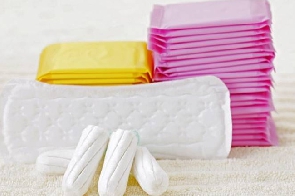General News of Monday, 24 August 2020
Source: www.ghanaweb.com
Ghana needs a local sanitary product factory – NGO tells government
Women in Ghana have lauded the governments for its promise to scrap the 20% luxury tax on imported sanitary products in the country.
Bridge for Equity, a non-governmental organization has called on the government to factor in a local sanitary manufacturing company in the One District One Factory policy to help cut down the cost of sanitary products.
For years, various organizations and bodies have been calling on the government to remove the tax on sanitary products to make it affordable for all, especially young girls in deprived communities.
Reports indicate that most girls in rural Ghana are prevented from going to school during their monthly menstrual cycle as a result of not being able to purchase sanitary pads.
But, speaking on Saturday, August 22, 2020, at the launch of the New Patriotic Partys (NPP) manifesto at Cape Coast, Vice president, Dr. Mahamudu Bawumia assured Ghanaians that they will scrap the tax on imported sanitary products in their next administration.
He indicated that “We (NPP government) will eliminate import duties on sanitary pads to improve health conditions, particularly for girls. It is very important. What we intend doing is to make sure we produce sanitary pads in Ghana until that happens in their numbers, we are going to eliminate import duties to bring down their cost.”
Speaking on the back of locally produced sanitary pad, the founder of 'Bridge for Equity', Lilipearl Baaba Otoo, in an interview with GhanaWeb, advocated that the country goes into the production of reusable sanitary pad which “can last for 4 years”, this she believes will drastically cut down on the prices of the product and also save the environment.
She stated that "the government can introduce the reusable sanitary pads…we are trying to fit this agenda into governments policies especially the 1 District One Factory, it is possible. We are trying to eradicate plastic; we consider that a reusable one will be more sustainable and efficient…they are healthier," she added.











